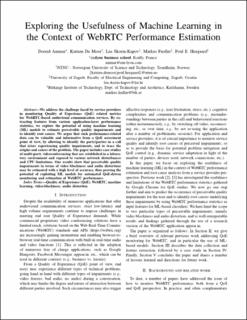Exploring the Usefulness of Machine Learning in the Context of WebRTC Performance Estimation
Chapter
Accepted version

Åpne
Permanent lenke
https://hdl.handle.net/11250/2648020Utgivelsesdato
2019Metadata
Vis full innførselSamlinger
Originalversjon
10.1109/LCN44214.2019.8990677Sammendrag
We address the challenge faced by service providers in monitoring Quality of Experience (QoE) related metrics for WebRTC-based audiovisual communication services. By extracting features from various application-layer performance statistics, we explore the potential of using machine learning (ML) models to estimate perceivable quality impairments and to identify root causes. We argue that such performance-related data can be valuable and informative from a QoE assessment point of view, by allowing to identify the party/parties in a call that is/are experiencing quality impairments, and to trace the origins and causes of the problem. The paper includes case studies of multi-party videoconferencing that are established in a laboratory environment and exposed to various network disturbances and CPU limitations. Our results show that perceivable quality impairments in terms of video blockiness and audio distortions may be estimated with a high level of accuracy, thus proving the potential of exploiting ML models for automated QoE-driven monitoring and estimation of WebRTC performance.